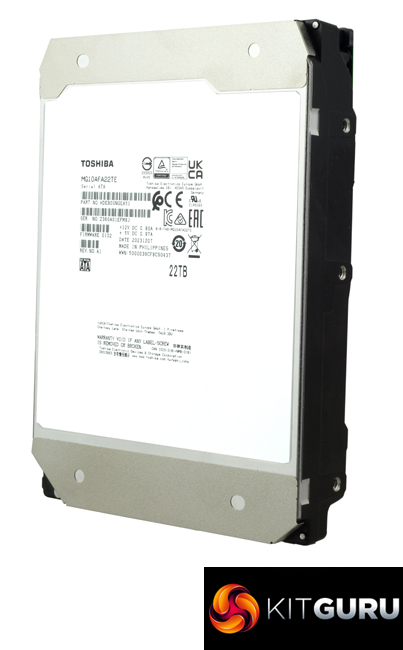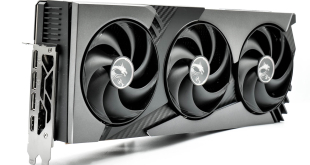The new flagship drive of Toshiba's MG10 family is the 22TB model (MG10AFA22TE). Offering 10% more capacity than the previous 20TB flagship model, the 22TB drive has been designed to answer the demands of data centre and cloud-scale infrastructures including mainstream enterprise storage arrays (RAID, software-defined), enterprise and cloud archive and data recovery systems, distributed file systems, Big Data and surveillance data storage systems.
The 22TB MG10 only comes in a 512e block size on demand (at the time of writing) and two interface versions, SATA 6Gbit/s and SAS 12Gbit/s (MG10SFA22TE). Both interface versions have two security options, SIE (Sanitize Instant Erase) and SED (Self Encrypting Drive) The two SATA 6Gbit/s choices are MG10AFA22TEY (SIE) and MG10AFP22TE (SED). The SAS-based drives are MG10SFA22TEY (SIE) and MG10SFP22TE (SED). Toshiba rates the transfer speed of the new drive as up to 271MB/s.
We could confirm the official transfer rate of the drive with both the ATTO and CrystalDiskMark benchmarks. Using ATTO the best read performance we saw was 272MB/s while the best write figure was 265MB/s. Using the default CrystalDiskMark Sequential (QD32 T1) test we squeezed a little bit more out of the drive with test results of 289.7MB/s and 283.9MB/s for reads and writes respectively.
As the density of discs used in 3.5in drives using Conventional Magnetic Recording (CMR) methods gets ever greater, technology has evolved to counter the threat of magnetic inter-track interference (ITI), a potential cause of tracking problems and data errors caused by tracks being so closely packed. TDMR (Two-Dimensional Magnetic Recording) technology, which uses two read elements in the drive head, has been developed to counter these problems during read operations, while Toshiba has gone one stage further and has brought Flux-controlled microwave-assisted magnetic recording (FC-MAMR) technology to the table to improve stability during write operations.
FC-MAMR directs more magnetic field flowing from the magnetic recording pole toward the recording media to increase its recording capacity by using a type of spin-torque oscillator. Two magnetic layers are built into the write gap of the write head and a bias current is applied which reverses the magnetization of one of the layers, an effect known as spin-transfer torque, improving the recording field and the performance of the write head.
Toshiba's MG10 drive series is aimed at the enterprise segment, a market that demands drives to work in a 24/7 365-day environment which can be a challenge in multi-drive bay storage systems due to vibration. To this end Toshiba have fitted the drives with RV (Rotational Vibration) sensors which compensate for any rotational vibration detected, eliminating the possibility of ‘knock-on' vibration in multi-bay systems along with Stable Platter, a technology that reduces vibrations by stabilising the motor shaft at both ends.
There are also two cache technologies built in to maintain performance and protect data. Toshiba’s Dynamic Cache Technology combines a self-contained cache algorithm with on-board buffer management to optimise how the cache is allocated during read/write operations while Persistent Write Cache Technology protects data being written to the disc in the case of power problems. If the power fails during a write operation, the data is saved in the large flash-based cache and written to the drive when the power is restored.
We found the Toshiba MG10AFA22TE on ebuyer for £384.98 (inc VAT) HERE.
Pros
- Huge capacity.
- Drive technologies.
- 5-year warranty
Cons
- All that drive technology doesn't come cheap.
KitGuru says: Toshiba's latest flagship drive for the MG10 Enterprise focussed product line adds 10% more capacity for the data centre and cloud-scale environments. Because of the 24/7 365-day nature of the work that these drives are put to, the MG10AFA22TE comes with a host of technologies to help maintain performance and data security.
 KitGuru KitGuru.net – Tech News | Hardware News | Hardware Reviews | IOS | Mobile | Gaming | Graphics Cards
KitGuru KitGuru.net – Tech News | Hardware News | Hardware Reviews | IOS | Mobile | Gaming | Graphics Cards




